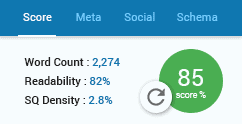
You publish content on your website or blog for a reason, right?
Out of scores of reasons, one of the biggest reasons why people want to publish content regularly on their websites and blogs is to improve their SEO.
Many SEO experts and content marketers suggest that never publish a piece of content without optimizing it for search engines.
Here, I’m assuming that when they say “optimizing” they don’t mean needlessly stuffing your blog posts and web pages with keywords.
What they mean to say is, make sure that you publish something, you target your effort in such a manner, that it helps to improve your SEO.
There are some great tools available that can help you search-engine-optimize your content.
For example, if you manage your website and blog with WordPress, you may be using one of the SEO plug-ins. I use SEOPressor. People also use Yoast SEO and All-In-One-SEO.
They are great tools to help you publish posts that are optimized for your chosen keywords.
A great thing that I like about SEOPressor is that it helps you see if you are over-optimizing your content.
Since I don’t intentionally overuse my keywords, when I use them, it is unintentional.
Sometimes, just in the flow, I tend to use the same expression again and again, mostly to sound lyrical.
This optimizes my content and consequently, my SEO suffers.
SEOPressor tells me when I have used the keywords more times than necessary.
But this small post is not about optimizing or over-optimizing for better SEO; this post is about not getting bogged down by the fact that you have to optimize every web page and blog post just because you have got tools with you that help you optimize.
For example, the SEOPressor tells you whether the web page on the blog post you are working on is well-optimized or not. If it is well optimized, you see this nice green response:

The problem here is (it has nothing to do with SEOPressor) that sometimes one tends to get psychologically bogged down by the fact that, that icon has to turn green. The entire focus is shifted on optimizing the web page instead of delivering the message.
Optimization is needed.
If you want to draw targeted traffic from search engines, there is no other option but to optimize your individual web pages and blog posts.
But you don’t need to obsess. You shouldn’t let your need to optimize every possible web page and blog post stop you from expressing yourself.
Optimize when you really want to, need to, optimize, but otherwise, let yourself be free.
Don’t dilute your content by writing about everything under the sun – stick to your core competency (in my case it is content writing and content marketing) – but sometimes if you don’t want to pay attention to the optimization aspect, don’t.
You don’t always have to write more than 1500 words.
You don’t always have to use your keywords within the first 100 words in the last paragraph.
No need to always worry about keyword density.
No need to worry about an optimized title.
Just write and publish.
This is very important for you as a professional and a professional who promotes himself or herself through his or her writing.
Your writing begins to get stunted when you focus more on optimization and less on your core message.
Again, yes, optimization is necessary and unavoidable but keep it a mix of free flow and optimized content.
Let it be like, in every 10 web pages and blog posts, don’t bother for optimization for 2-3.
Remember that what is important is that you publish regularly.
Don’t feel discouraged that right now you cannot come up with a completely optimized web page or blog post.
Publishing something is always better than publishing nothing.
